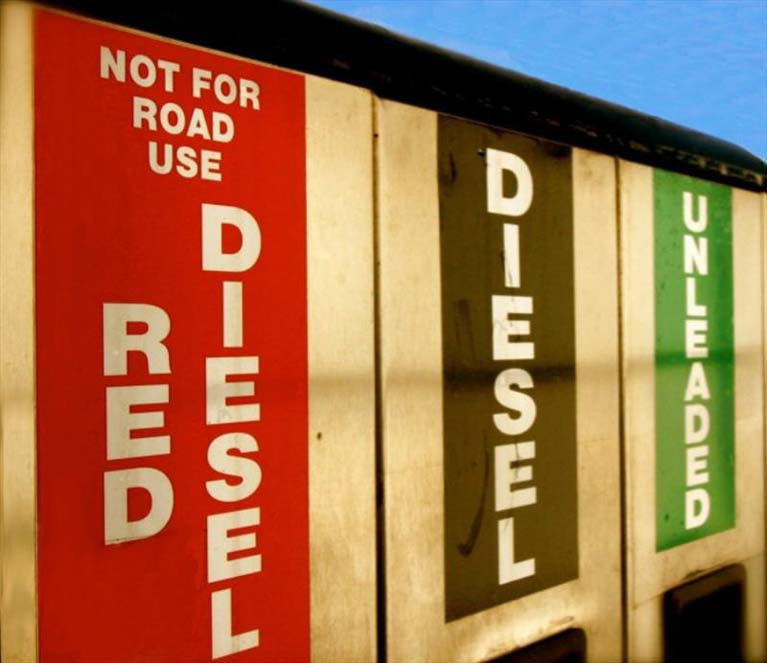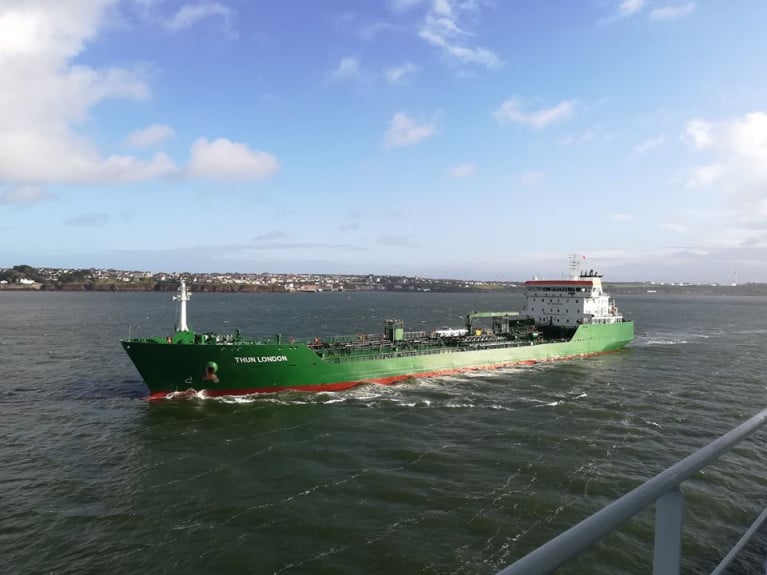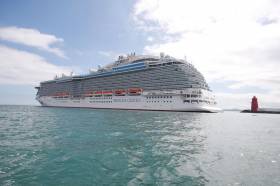Displaying items by tag: consultation
MARA Running Stakeholder Survey for Its Statement of Strategy
The Maritime Area Regulatory Authority (MARA) is currently in the process of developing its first statement of strategy for the period 2024-2027.
A key priority of this process is to garner the views and input of key stakeholders through consultation. To that end, MARA has launched an online survey to garner views until 5pm next Monday 19 February.
This survey portal is facilitated by Mazars and all contributions will be treated as private and confidential. Individual responses will not be viewed by anyone in MARA, however consolidated data will be shared to inform the strategy development process.
If you have any issues when completing this survey, contact Mazars directly at [email protected].
MARA was established in July 2023 under the National Marine Planning Framework as the State agency which will act as the regulator and thus protector of the maritime area for the benefit of current and future generations of Irish people.
The Department of Transport back in October launched 'A review of the National Ports Policy' which consists of a two-part consultation process, noting that final submissions from stakeholders will close on 15th January, 2024.
Part 1 will involve the publication of an Issues Paper, inviting submissions from stakeholders. Part 2 will be a shorter public consultation on the Draft Policy document. The objective is to present a new draft policy to the Government in 2025 following a thorough and inclusive consultation.
As an island nation on the periphery of Europe, the maritime transport sector plays a crucial role in the functioning of our economy.
Approximately 90% of all goods traded by Ireland pass through our commercial port network, underscoring the importance of a resilient and efficient maritime transport industry for our economic success.
The importance of our ports is not just economic. Located, as many ports are, in the heart of urban centres and areas of environmental significance, how our ports interact with both the communities that provide their social licence to operate, and the marine environment is something in which we all have a vested interest. This revised policy will provide the vision for how our ports will meet these challenges.
Submissions
The consultation period remains open until 15 January 2024. Stakeholders and interested parties will now have the opportunity to respond to the issues raised in the Issues Paper as well as put forward any other relevant issues for consideration.
The Department asks that submissions be completed online with reference to the questions outlined in the link provided in the National Ports Policy section on page 4 in the 2023 Public Consultation Paper (click here to access). However, should an online submission not be feasible, submissions are welcomed via email to [email protected] or send by post to Maritime Transport Division, Department of Transport, Leeson Lane, Dublin, D02 TR60
Closing date for receipt of submissions is close of business is 15 January 2024 at 6pm.
In 2023, the Irish Ports Capacity Study was completed.This study evaluates the capacity of the port system to address both current and future demands up to 2040.
The Executive Summary of this report, which outlines the study's methodology, conclusions, and recommendations, is available alongside the National Ports Policy Issues Paper for your reference.
First Stage of Consultation Opens for National Ports Policy Review
As previously reported on Afloat.ie, the Department of Transport has commenced a review of its National Ports Policy.
As an island nation on the periphery of Europe, the maritime transport sector plays a crucial role in the functioning of Ireland’s economy. Some 90% of all goods traded by Ireland pass through the commercial port network, underscoring the importance of a resilient and efficient maritime transport industry for the country’s economic success.
But the importance of Ireland’s ports is not just economic. Located as many ports are in the heart of urban centres and areas of environmental significance, how Ireland’s ports interact with both the communities that provide their social licence to operate and the marine environment is something in which we all have a vested interest.
This revised policy aims to provide the vision for how Ireland’s ports will meet these challenges.
The review consists of a two-part consultation process. The first part involves the publication of an issues paper and consultation with all interested stakeholders who are invited to make a submission.
Upon completion of the first stage, it will be followed by a shorter public consultation on the draft policy document. The objective is to present a new draft policy to the Government in 2025 following a thorough and inclusive consultation.
Submissions are now invited for the first part of the process on the ports policy issues paper. Details on this paper and the consultation process can be found on Gov.ie and the final date for receipt of submissions is 6pm on 15 January 2024.
Following the launch of its Navigating the Future strategic plan, RYA Northern Ireland has been looking at governance structures to ensure it is are set up in the best way possible to progress as a sport and organisation.
This process has been started by looking at the recruitment of three new board directors and has followed by the refresh of the board sub committees. As part of this process, the board have also considered the term length for the chair and the adoption of charitable status.
The board have discussed both areas but want members and affiliated clubs to have an opportunity to hear about proposed plans and feedback any views.
To that end, anyone involved in sailing and boating in Northern Ireland is invited to a webinar on Thursday 10 August at 7pm to hear more, as well as meet and hear from members of the board with an opportunity to ask questions about any areas of the business.
This will be the first of quarterly webinars and there will be a chance to check in with board/staff members for an update on key areas or ask any questions/advice.
Chair term length consultation
The current chair term is set for a single three-year term. The board would like to change the chair’s term to include an option of an additional two years, which would result in a three-year term plus the option for an additional two-year term, and are asking affiliated clubs to approve this change.
RYANI suggests the following advantages and rationale of an extended chair term:
- Gives the chair a longer period to build a strong relationship with the CEO and other board members, creating greater consistency momentum for the Board and staff team
- Create better alignment with the Home Countries (RYA Wales: 2 x 4 years term for chair; RYA Scotland: 2 x 2 years; RYA: 3 x 3 years)
- Create a smoother and longer preparation time for finding and handover for a new Chair
- Creates an opportunity to build momentum following the launch of the new five-year strategy, Navigating the Future (or any future strategic plans)
It also acknowledges disadvantages to the change:
- More challenging if there is a poor relationship between the chair and the rest of the board/CEO (although the break option at three years partly negates this)
- More difficult to find a chair that is prepared to take on a longer term length (again negated slightly with potential break at three years)
Charity status consultation
RYANI is currently set up as a Company Limited by Guarantee and works on a not-for-profit basis. The company has been researching whether a move to a charitable organisation would benefit in the long term. Other sporting organisations that have taken up charitable status include Ulster Hockey and Netball NI.
Benefits to a move to charitable status would include additional funding opportunities becoming available that could support the organisation to develop and enhance sailing and boating across Northern Ireland.
The feedback from RYA and other national governing bodies in NI that have charitable status is that there has not been significant additional workload identified and it is no more bureaucratic than being a Company Limited by Guarantee.
The board have approved a motion to pursue charitable status and are asking for affiliated clubs support for a change in articles to enable RYANI to start the process with the NI Charity Commission, which would include a change in articles.
To hear more about the two proposed changes, book your place at the webinar on the Eventbrite page HERE.
RYA Northern Ireland is calling for anyone who has an interest in boating to take part in an interactive session to help develop the strategy for sailing, boating and windsurfing in Northern Ireland.
A high-level summary of the strategy, which will cover the next three to five years, was shared at RYA Northern Ireland’s Affiliated Club Conference this weekend.
An online consultation process will then open in the week commencing Monday 12 December and two online consultation sessions will take place on Tuesday 10 and Friday 13 January. All of these will help inform the development of the next stages of the strategy, the regional sailing body says.
RYANI’s chief operating officer Greg Yarnall says: “We are excited to begin further consultation on our new strategy and are looking forward to working with those who help make our sport happen.
“As part of this process, we will be sharing and asking for feedback on where we have got to so far. This will include the emerging strategic priorities, our values — beliefs and behaviours — and the guiding principles that will help us when making decisions.”
He adds: “These consultation sessions and online feedback sessions are vital as the strategy needs to feel relatable to the people involved in the sport, as participants or as volunteers, coaches, instructors or officials.
“We want the whole boating community to feel connected to the strategy and for it to be clear how everyone will be able to contribute to helping the sport prosper over the coming months and years.”
Places can be booked now via Eventbrite for the January interactive consultation sessions. And full details on the consultation process will be available on the RYANI website on 12 December.
The online consultation survey should take between 15-20 minutes, and the closing date for submissions is 5pm on Tuesday 17 January 2023.
This story was updated on Tuesday 13 December with a link to the online survey and details of the closing date.
RYA Urges Engagement With UK Red Diesel Consultation
The British Government has launched its long-anticipated consultation with red diesel users across the UK, including Northern Ireland, following the news of plans to restrict the fuel’s usage from 2022.
This past April the UK’s Cruising Association confirmed Westminster’s intention to legislate for a ban on the use of subsidised dyed or ‘red’ diesel except for agriculture, railway and non-commercial heating.
The move is being touted as a way to tackle climate change by giving businesses an incentive to improve their energy efficiency.
But it would also bring the UK into line with EU regulations, as has Ireland’s own ban on green diesel use for cruising and leisure boating which came into force at the start of this year.
The HMRC consultation, which is open until Thursday 1 October, will seek the input of recreational boaters, among others, to determine whether they and other sectors should be allowed to maintain use of red diesel beyond April 2022.
The UK’s Royal Yachting Association (RYA) insists that it backs efforts to increase energy efficiency in the short-term and to strive towards a zero-carbon future.
However, it also makes the case for retaining red diesel based on “existing supply needs, not colour, tax status or price”.
The RYA says: “Recreational boaters already pay the full rate of duty and VAT when purchasing fuel for the purposes of propulsion.
“We will therefore be looking at the proposals to reform the tax treatment of red diesel closely to see how this might affect the supply of fuel for recreational use for both propulsion and how it will impact supply for domestic usage such as heating.
“It is a fact that the further west and north you travel in the UK, the more likely it is that you will have to rely on waterside outlets that only supply red diesel for commercial purposes, such as to fishing fleets.
“In many places, some remote, the limited quantities of fuel used by recreational craft do not warrant the cost of installing additional equipment to supply white diesel for the recreational boating sector.
“If the Government removes the entitlement to use red diesel from most sectors from April 2022 and white diesel is then made as widely available as red diesel is now, then supply of fuel will not be affected.
“The RYA will be responding to this call for evidence and urges any members with an interest in red diesel to participate in the consultation.”
New UK Treasury Minister Announces Ten-Week Consultation to Rapidly Establish 10 Free-Ports
Ports in the UK, once designated as freeports, will have no domestic taxes levied on any goods within them, according to a Multimodal news update.
Taxes will only be levied when a product leaves the freeport, and enters the rest of the UK.
This has the effect of encouraging international business to come to the UK to process or store goods with little to no red tape, bringing jobs and investment in the mainly coastal communities that have been neglected during the UK’s membership of the EU. Ten are set to be designated by the end of the year.
OrderOrder has more to report on the story and on the industry leaders which have already started lobbying for freeport status.
Afloat adds among the freeports proposed is an Atlantic freeport in Wales located on the Milford Haven Waterway. Where (pictured above) is tanker, Thun London (18,650 deadweight) one of five new chemical product tankers for a Swedish lake based shipping group.
Thun London, Afloat also adds yesterday completed a passage from the Welsh waterway (incl. Pembroke Dock) to Dublin Port where the new vessel remains berthed today.
Views of the public, businesses and other interested parties is been sought from Dublin Port Company, on the benefits of investing €108 million in terminal facilities to attract more cruise ships, writes The Irish Times.
The semi-State company (yesterday) launched a public consultation on the future of cruise tourism, seeking opinions on the appetite in the city for his large-scale tourism business, managing the increase in air emissions from additional cruise ships and the financial challenge of funding the proposed new berths.
Economic consultants Indecon estimate the €108 million spent on new berths at the port’s North Wall Quay extension between 2024 and 2026 could generate a net economic benefit of €211 million based on 2019 values.
The port company, however, has said it cannot finance the project itself given its €1 billion plan to build extra capacity to accommodate the projected growth of cargo up to the year 2040.
The proposed new berths would be of limited alternative use outside of cruise ships such as for generating revenue for cargo operations, the company said.
Click here for more on the story.
George’s Dock ‘White Water Rafting Centre’ Plans Now Open For Public Consultation
Plans for a white-water rafting circuit in the heart of Dublin have come back to the fore, as The Irish Times reports.
Earlier this year Dublin City councillors were presented with plans for scheme, which aims to transform George’s Dock in the north inner city into an “elite” white-water canoeing, kayaking and rescue training facility.
Plans stalled before the elections, with former lord mayor Nial Ring branding the White Water Rafting Centre proposals as a “white elephant”.
Changes in the council since this summer’s local elections have now seen the project revived, and it has been opened for public consultation until Thursday 3 October.
But the former lord mayor’s sentiments are echoed by critics who suggest there has been “no consideration” for inner-city youths in the proposals.
Irish Marine Federation Welcomes Public Consultation On Draft Marine Planning Policy Statement
Feedback from the public and interested stakeholders is being sought on the Government’s Marine Planning Policy Statement by Friday 9 August.
The statement sets out efforts to bring marine planning “into the mainstream of Government functions” as issues surrounding land use, climate change and more come into greater focus.
Earlier this year, it was reported that more than half of submissions in the public consultation on the National Marine Planning Framework Baseline Report concerned the marine environment.
In its own submission, the Irish Marine Federation said barriers to investment and sustainability around the Irish coastline have for “took long stymied growth in the marine sphere”.
The trade body’s chair Paal Janson says its members voices are being heard at regular meetings with Minister of State Damien English in The Custom House, and he looks forward to incorporating feedback from its members on the policy statement consultation draft, which is attached below.




























































